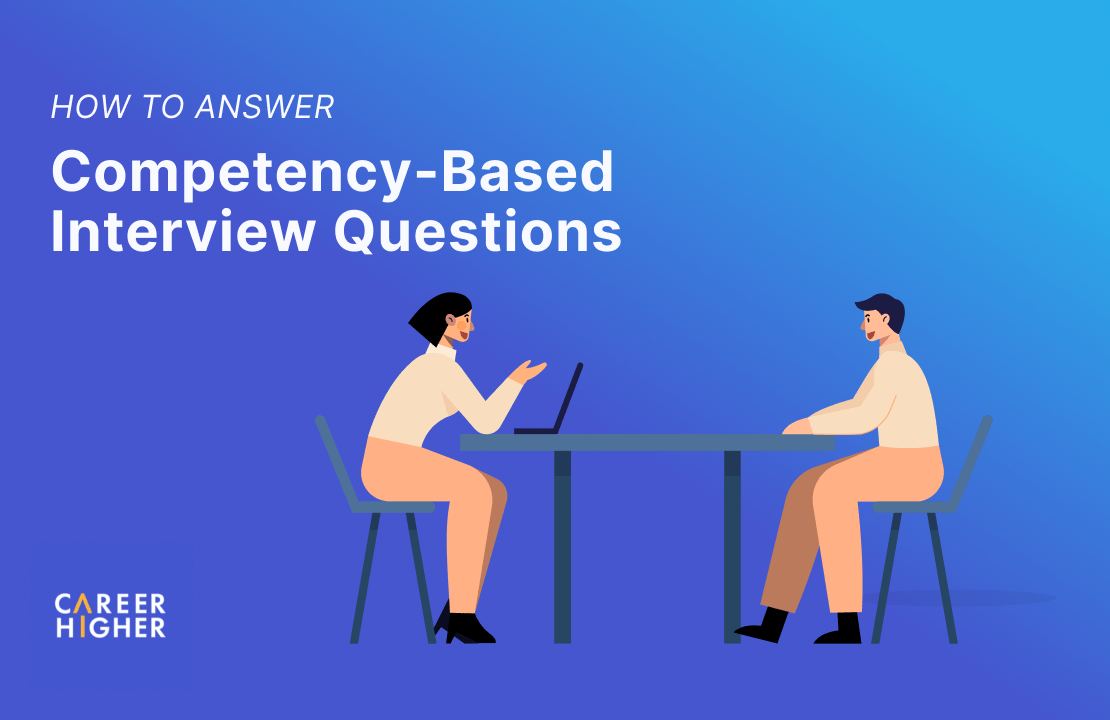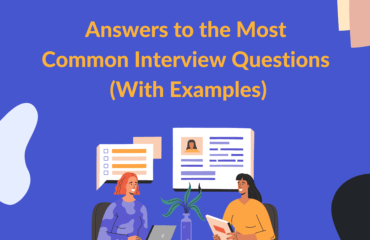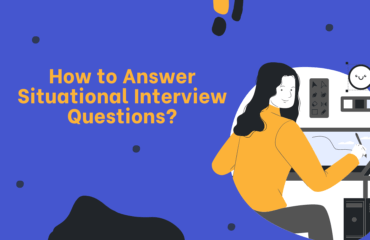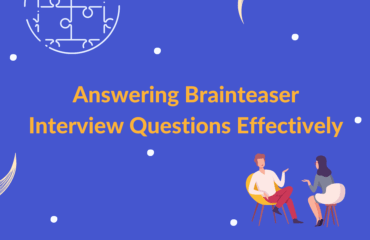Table of Contents
- What are Competency-Based Interview Questions?
- 15 Competency-Based Questions for Executive Interviews
- Key Competencies Evaluated in Executives
- How to Answer Competency-Based Questions?
- Competency-based Interview Questions and Examples
- Tips for Excelling at Competency-Based Interviews for Executives
- Conclusion
Competency-based questions are one of the most popular categories of interview questions, and not without good reason. They can reveal a lot about a candidate’s skills, past experiences, and mindset. These questions are particularly prevalent in interviews for senior-level positions and tend to be a focus early in the interviewing process.
In this blog, we’ll guide you through understanding what these questions are, why they are essential, and how to answer them effectively using the S.T.A.R. technique.
What are Competency-Based Interview Questions?
Competency-based questions require candidates to provide real-life examples that demonstrate specific skills or attributes, such as leadership, problem-solving, or adaptability. Typically framed as “Tell me about a time when…” or “Give me an example of how you…”, these interview questions aim to uncover how candidates have handled real-world situations. This helps employers evaluate how candidates might perform in similar roles in the future.
15 Competency-Based Questions for Executive Interviews
Here’s a list of 15 competency-based interview questions that executives might encounter in an interview. They focus on key areas such as strategic decision-making, leadership, crisis management, and more.
1. Leading Through Change: Describe a significant change you initiated. How did you manage the transition?
2. Strategic Decision-Making: Can you provide an example of a tough strategic decision you made? What were the outcomes?
3. Innovative Thinking: Tell me about a time when you brought innovation to your organization.
4. Crisis Management: Describe how you handled a crisis in your previous role.
5. Building and Leading Teams: How do you build and maintain high-performing teams?
6. Global Leadership: Can you discuss your experience managing global teams?
7. Fiscal Responsibility: Describe a time when you had to cut costs or manage a budget effectively.
8. Ethical Leadership: Provide an example of how you handled an ethical dilemma.
9. Client Relationships: Tell me about a time you turned a negative client situation into a positive one.
10. Adapting to Technology: How have you integrated new technologies into your organization?
11. Corporate Social Responsibility: How do you ensure your company practices corporate social responsibility?
12. Supporting Others: Tell me about a time you supported a co-worker who was struggling.
13. Diversity and Inclusion: How do you prioritize diversity and inclusion in your leadership approach?
14. Managing Growth: Describe your experience in scaling a business and managing growth.
15. Continuous Improvement: How do you measure and ensure continuous improvement in your organization?
Key Competencies Evaluated in Executives
When interviewing for executive positions, employers look for competencies that are critical for high-level performance and strategic decision-making. Common competencies include:
- Leadership: The ability to guide and motivate others to achieve shared goals, inspiring confidence and action throughout the organization.
- Strategic Thinking: Planning and executing strategies that advance business goals, demonstrating a clear understanding of how various elements of the business interconnect.
- Resilience: Overcoming challenges and bouncing back from setbacks with a positive, forward-looking approach to problem-solving.
- Communication: Effectively conveying information and fostering open communication to ensure clarity and alignment within the organization.
- Problem Solving: Identifying solutions to complex problems, demonstrating an analytical approach, and a strong capability to think critically under pressure.
- Innovation: Driving new ideas and creative solutions that keep the organization ahead of technological or market trends, encouraging a culture of continuous improvement.
- Financial Acumen: Managing the organization’s financial performance with skill, including budgeting, forecasting, and maximizing shareholder value.
- Visionary Leadership: Articulating a clear and compelling vision for the future of the organization, aligning short-term and long-term objectives with strategic initiatives.
- Integrity and Ethics: Maintaining high ethical standards and transparency, ensuring all business practices adhere to legal standards and moral principles.
How to Answer Competency-Based Questions?
To effectively tackle competency-based questions, it’s crucial to structure your responses in a manner that demonstrates your relevant skills and how these will address potential challenges in the role you’re applying for. The S.T.A.R. method is a great tool for organizing your answers to illustrate clearly your competencies through concrete examples. Here’s a step-by-step guide on how to prepare for these questions:
Step 1: Identify Potential Questions
The first step in preparing for competency-based questions is to identify the types of questions that are likely to be asked. Start by analyzing the types of jobs you’re applying for, focusing on their common scope of work and requirements. Consider your career goals and the specific competencies that are crucial for these roles.
You can also use tools like ChatGPT to generate potential questions. Here is an example:
“I am preparing for an executive-level interview for a Chief Financial Officer (CFO) position at a mid-sized technology company. The job description emphasizes financial strategy, cost management, and team leadership. Here is the job description: [paste job description here]. Here is my resume: [paste resume here]. Can you generate a list of potential competency-based interview questions based on these key responsibilities?”
Step 2: Develop Relevant Stories
Reflect on your past roles and experiences to come up with stories that align closely with the questions you’ve identified. Focus on instances where you demonstrated the specific skills and competencies required for the job. If you can’t think of exact matches, focus on transferable skills—abilities and competencies that are valuable across different roles and industries, such as leadership, problem-solving, and communication.
Think about major projects you have led or challenges you have overcome. Consider what actions you took, how you led the team, and what the outcomes were. Discussing your past experiences with trusted colleagues can help jog your memory about impactful moments you might have overlooked.
Step 3: Structure your Answer using The S.T.A.R. Technique
After identifying relevant stories, structure them using the S.T.A.R method. The S.T.A.R. technique is a systematic way to answer competency-based questions by elaborating on four key aspects:
- Situation: Describe the context within which you were operating.
- Task: What were your responsibilities?
- Action: Detail the specific actions you took to address the situation.
- Result: Explain the outcomes of your actions.
This method helps structure your responses in a clear, concise, and engaging manner, ensuring you highlight your competencies effectively.
Here is an example:
- Situation: “In my previous role as CFO, we faced significant budgetary constraints during an economic downturn.”
- Task: “My responsibility was to lead the budget revision efforts to sustain our operations without sacrificing strategic projects.”
- Action: “I implemented a thorough review of all expenditures, prioritized essential projects, and negotiated better terms with our suppliers.”
- Result: “We achieved a 20% reduction in costs while maintaining key initiatives, which contributed to a stronger financial position when the market stabilized.”
Step 4: Practice your Answers
Practice makes perfect. Rehearse your responses in front of a mirror, or even better, with a friend or family member. If you’re looking for professional help, interview specialists can be beneficial. Practicing will help you articulate your thoughts clearly and confidently during the actual interview.
Competency-based Interview Questions and Examples
We’ve covered the basics. Now, let’s see some examples of competency-based interview questions. For each question, we will give you the skill that’s been evaluated and guidelines on how to answer. We recommend reading the question, identifying the skill, and thinking of an answer before considering our suggestion. Here are 12 examples of competency-based interview questions:
1. Leading Through Change
Question Prompt: Describe a significant change you initiated at your organization. How did you manage the transition?
Answer Strategy: Describe your methodology for leading change, emphasizing your strategic planning, stakeholder engagement, and communication skills. Highlight how you anticipate potential challenges and mitigate them through proactive leadership. It’s crucial to demonstrate your ability to not only initiate change but also to sustain momentum through team motivation and adaptive strategies.
Example Answer: “At my previous company, we were struggling with outdated systems that hindered productivity and innovation. I led a major digital transformation initiative to modernize our IT infrastructure. The challenge was significant due to employee resistance and potential disruption to ongoing projects. I started by establishing a clear vision and detailed roadmap, then communicated regularly with all stakeholders to ensure alignment and address concerns. We provided comprehensive training to equip everyone for the transition. This proactive approach resulted in a 35% increase in operational efficiency”
2. Strategic Decision-Making
Question Prompt: Can you provide an example of a tough strategic decision you made? What were the outcomes?
Answer Strategy: Focus on your ability to analyze complex data and forecasts to make informed strategic decisions. Discuss how you consult with key stakeholders to gain diverse perspectives before finalizing decisions. Emphasize your knack for balancing risk with potential benefits, illustrating your strategic thinking with a specific example that led to measurable success.
Example Answer: “Our company faced a tough decision on whether to enter a new market that appeared highly lucrative but was also intensely competitive. I conducted a thorough risk-benefit analysis, examining market data and forecasts. I then consulted with key stakeholders, including senior management and industry experts, to gather diverse perspectives. We decided on a phased market entry strategy with close monitoring of performance metrics. This approach paid off, doubling our market share in two years and solidifying our position in the new market.”
3. Innovative Thinking
Question Prompt: Tell me about a time when you brought innovation to your organization.
Answer Strategy: Explain your approach to fostering innovation within your teams, including how you encourage creative thinking and experimentation. Discuss the importance of staying abreast with technological advancements and industry trends to drive innovation. Detail a specific instance where your innovative approach solved a business problem or captured a new opportunity.
Example Answer: “At my previous company, we faced challenges with our traditional marketing strategies. Recognizing the need for a more data-driven approach, I introduced an AI-driven analytics system. I formed a cross-functional team to explore AI advancements and identify potential applications. By customizing a robust analytics platform, we gained deeper insights into customer behavior and preferences. This allowed us to tailor our marketing campaigns more precisely, resulting in a 40% increase in lead conversion rate within the first year.”
4. Crisis Management
Question Prompt: Describe how you handled a crisis in your previous role.
Answer Strategy: Demonstrate your competency in crisis management by outlining your ability to quickly assess situations, develop action plans, and lead with decisiveness. Stress the importance of clear communication and team alignment during a crisis. Provide an example where your leadership minimized the impact of the crisis and led to a rapid recovery.
Example Answer: “When our main product line faced a critical supply chain disruption, I quickly assessed the situation and developed an action plan. I established a crisis team, communicated transparently with stakeholders, and identified alternative suppliers. By reallocating resources and prioritizing key operations, we maintained production continuity. My decisive leadership and clear communication minimized the impact, and within a month, we restored full operations, preserving customer trust and avoiding significant financial losses.”
5. Building and Leading Teams
Question Prompt: How do you build and maintain high-performing teams?
Answer Strategy: Illustrate your strategic approach to team building, including how you identify and align skills with organizational needs. Discuss your leadership style in fostering a culture of transparency and empowerment among team members. Highlight a scenario where your leadership directly contributed to enhanced team productivity and morale.
Example Answer: “I focus on aligning team members’ strengths with organizational needs by thoroughly assessing individual skills and matching them to the right roles. In a recent project, I restructured a team by identifying each member’s core competencies and redistributing responsibilities accordingly. I also introduced regular feedback sessions and open communication channels to foster a culture of transparency and empowerment. This restructuring led to a 50% increase in productivity and significantly reduced turnover.”
6. Global Leadership
Question Prompt: Can you discuss your experience managing global teams?
Answer Strategy: Detail your experience managing global teams, emphasizing cultural sensitivity and inclusive leadership practices. Discuss strategies for overcoming communication barriers and aligning remote teams with corporate goals. Share a specific example of a global project you led that achieved success through your effective leadership.
Example Answer: “I managed a team spread across three continents, dealing with time zone differences and language barriers. To address these challenges, I implemented a structured communication schedule, ensuring overlap times for real-time collaboration. I utilized collaboration tools with multilingual support and conducted cultural sensitivity training. By fostering an inclusive environment and maintaining regular updates, we increased team efficiency and improved project delivery times by 30%”
7. Fiscal Responsibility
Question Prompt: Describe a time when you had to cut costs or manage a budget effectively.
Answer Strategy: Outline your methods for financial stewardship, emphasizing cost control, budget management, and resource allocation. Discuss how you prioritize investments and the role of financial analysis in decision-making. Provide a concrete example where your fiscal management significantly contributed to the organization’s financial health.
Example Answer: “Facing a tightening budget, I needed to cut costs without compromising our product quality. I initiated a comprehensive strategic review of all expenditures and identified opportunities for optimization. I implement a shared services model, centralizing support functions such as HR, IT, and finance across multiple departments. This approach reduced redundancy and improved resource allocation. Additionally, I negotiated long-term contracts with key suppliers to lock in lower rates. These actions led to a 25% reduction in operating expenses.”
8. Ethical Leadership
Question Prompt: Provide an example of how you have handled an ethical dilemma.
Answer Strategy: To demonstrate ethical leadership, emphasize your proactive approach to maintaining integrity and transparency throughout your decision-making. Detail your method for navigating ethical challenges, highlighting your reliance on established corporate governance frameworks to uphold standards. Focus on a specific example where your leadership in resolving an ethical issue had a tangible positive effect on your organization, reinforcing trust and ethical standards.
Example Answer: “Upon noticing discrepancies in our financial reports, I initiated a comprehensive audit involving all relevant stakeholders. My focus was on transparency and collaboration to address the discrepancies. This process not only corrected the errors but also reinforced our financial integrity and led to improved controls, enhancing trust across the company.”
9. Client Relationships
Question Prompt: Tell me about a time you turned a negative client situation into a positive one.
Answer Strategy: Describe your approach to building and maintaining robust client relationships, including how you handle challenges and manage expectations. Emphasize your focus on understanding client needs and tailoring services to meet those needs. Provide an example of how your strategic relationship management turned a client challenge into a business opportunity.
Example Answer: “A key client was unhappy with a delayed project delivery, putting our partnership at risk. I immediately met with them to understand their concerns and apologize. I then expedited the project by reallocating resources and providing frequent updates. My proactive approach not only salvaged the relationship but also impressed the client with our commitment. As a result, they awarded us three additional contracts, turning a potential loss into a significant business opportunity.”
10. Adapting to Technology
Question Prompt: How have you integrated new technologies into your organization?
Answer Strategy: Discuss your proactive approach to technological adaptation, including how you stay informed of new tools and trends. Explain how you lead technology implementation projects, ensuring team buy-in and training. Cite a specific technology adoption you championed that led to improved operational efficiency.
Example Answer: “At my previous company, we faced outdated IT infrastructure that was hindering efficiency and increasing costs. I spearheaded the adoption of cloud technology, leading a cross-departmental team to manage the transition. This involved conducting extensive training sessions for staff to ensure smooth implementation. As a result, we reduced operational costs by 25% and significantly improved data accessibility, which enhanced overall productivity and collaboration across departments.”
11. Corporate Social Responsibility
Question Prompt: How do you ensure your company practices corporate social responsibility?
Answer Strategy: Explain how you integrate CSR into the company’s core strategies and the importance of sustainable practices. Discuss how CSR initiatives align with business objectives and stakeholder expectations. Highlight a CSR project you led that had a significant social or environmental impact.
Example Answer: “At XYZ Corporation, we faced pressure to improve our sustainability practices. I was tasked with developing a comprehensive sustainability program. I led a team to audit our resource use and waste production, then implemented initiatives like reducing single-use plastics, adopting energy-efficient technologies, and enhancing recycling efforts. We integrated these into our corporate strategy and communicated them to all employees. As a result, we achieved a 30% waste reduction and 20% energy savings in the first year, boosting our appeal to eco-conscious consumers.”
12. Supporting Others
Question Prompt: Tell me about a time you supported a co-worker who was struggling.
Answer Strategy: Describe your approach to recognizing when colleagues need support and how you provide appropriate assistance without compromising your responsibilities. Highlight the importance of fostering a supportive culture that encourages collaboration and mutual support among team members. Share a specific instance where your support helped a colleague overcome a professional challenge, which in turn benefited the entire team.
Example Answer: “At ABC Company, I worked in the accounts payable team, ensuring our payments were made timely. This one time, I observed my colleague in the accounts receivable team struggling to get payments from our clients and I offered to help get her work up to speed. So, one day I made collection calls with her, knowing my work could wait until the next day. Seeing her discouraged and unmotivated, I felt it was the right thing to do. I also shared with her some tools and techniques I used to keep my work organized.”
Tips for Excelling at Competency-Based Interviews for Executives
Now that we have explored popular competency-based questions, let’s dive into a few key tips for a successful interview :
- Self-Reflect: Before your interview, take a deep dive into your professional history. Identify pivotal moments, projects, or challenges where you demonstrated the competencies required for the C-suite role. Consider scenarios that showcase your ability to navigate complex situations, lead significant changes, or drive strategic growth.
- Utilize Varied Examples: Relying solely on recent or high-profile examples might not fully demonstrate your depth of experience. Mix in different scenarios from various points in your career to show consistency and growth in your competencies. This variety can also illustrate your adaptability and how you’ve applied lessons learned over time.
- Emphasize Learning and Growth: When using the S.T.A.R. technique, consider adding a ‘Learning’ segment to your answers. After describing the Result, reflect on what the experience taught you and how it shaped your subsequent decisions and leadership style. This approach can be particularly compelling, as it shows your commitment to continuous personal and professional development.
- Stay Relevant and Concise: While detail is important, excessive information can detract from the key points you need to communicate. Keep your answers concise and focused on the elements that are most relevant to the question and your role. This precision will help maintain the interviewer’s interest and convey your points effectively.
- Prepare for Variations: Competency-based questions can be phrased in various ways. Be prepared to adapt your stories to fit different questions. Having a flexible mindset will allow you to smoothly tailor your examples to the specific competencies the interviewer is probing.
Conclusion
Competency-based interview questions are more than just a challenge; they are an opportunity. They allow you to showcase your leadership, strategic thinking, and problem-solving skills in a way that resonates with decision-makers. By preparing thoughtfully and responding effectively, you position yourself as a candidate who is not only capable but also ready to lead and inspire.
As you reflect on your past roles and prepare your responses, keep the job description and desired competencies in mind. Practicing your responses using the S.T.A.R. format can give a good structure to your answer, ensuring you convey your experiences compellingly during the interview. For expert guidance on how you could ace your upcoming job interview, you could take up our interview preparation services.











